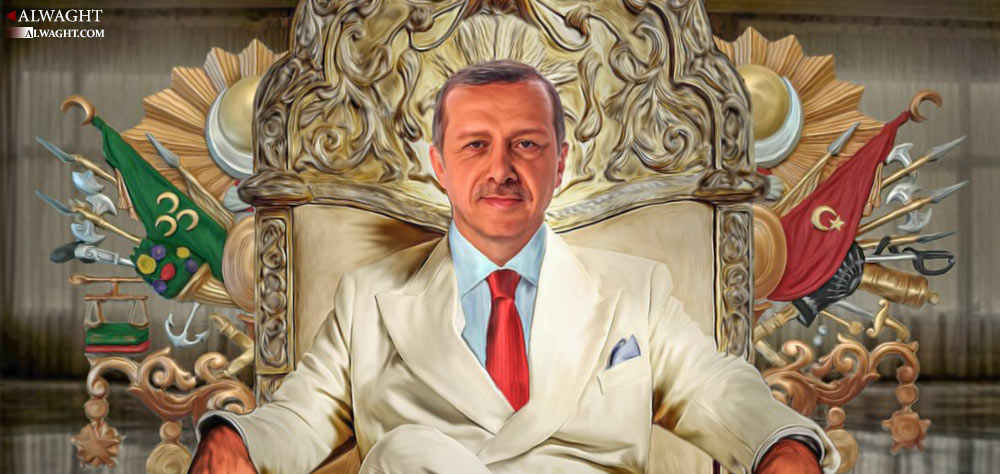Alwaght- Turkey’s president Recep Tayyip Erdogan has perfected the art of contradictory approach to foreign policy confounding both friends and foes.
When Turkey’s Prime Minister Binali Yildirim took office in May, he declared that more friends and fewer enemies would be the new foreign policy slogan which sounded similar to the “zero problems” foreign policy advanced by his predecessor Ahmet Davutoglu. This approach was perplexing as Ankara healed few of its prolonged disputes with neighbors but at the same time ignited new ones.
There are several instances when Erdogan has made complete turnaround in his policies thus puzzling the country’s partners.
Embracing the Enemy of Palestine
In the most recent case, last week Israeli regime's first ambassador to Turkey since 2010 presented his credentials to Erdogan, the normalization of ties after a bitter diplomatic row.
On May 31, 2010, Israeli regime forces brutally attacked the Turkish-flagged ship, MV Mavi Marmara, that was part of the Freedom Flotilla in the high seas in the Mediterranean Sea, killing ten Turkish citizens, including a teenager and wounding about 50 other people who were part of the team on the six-ship convoy. The flotilla was attempting to break the Israeli regime's naval blockade of the Gaza Strip, carrying aid to the Palestinians in the impoverished enclave. Five years after the incident Ankara has restored ties with the Tel Aviv regime. During the 2010 Flotilla incident, Erdogan claimed to be the champion of Palestinian rights but has now embraced the number one enemy of Palestinians and Muslims.
Fear of Russian Wrath
The other recent case of Turkey sudden change in stances relates to ties with Russia. In November 2015, Turkish fighters shot down a Russian Sukhoi 24 jet which was on a mission in the war on ISIS terrorist group inside Syria. This act of hostility infuriated Russia but Turkey appeared unmoved. Moscow imposed sanctions on Turkey’s economy, including reducing Turkish food exports to Russia, limiting the activities of Turkish construction firms, while Russian tourists' numbers also declined. The consequences of Turkey's actions began to sink in and therefore a humbled Erdogan apologized for the death of the Sukhoi pilot. Moscow and Ankara have now normalized ties and the two leaders exchanged visits but they still remain at loggerheads over Syria policy.
Syria Policy Contradictions
Late November Erdogan said Turkey launched its offensive against Syria to overthrow the government of President Assad and not for anything else. Following the remarks, Russia demanded that Erdogan clarifies his statement. Once again Erdogan, in apparent bid to avoid jeopardizing his fragile rapprochement with Moscow, backed down last Thursday and said that Turkey’s military operation in Syria was against terror groups.
In the domestic front Erdogan has had an erratic engagement with the Kurds including moderate elements in the community. Early November Turkish authorities arrested top members of the Kurdish People’s Democratic Party (HDP) thus putting in peril the delicate peace process. Erdogan is also infuriated by the role the Kurds a playing in fighting terrorists in Syria and is wary of their growing power.
Reviving the Ottoman Empire
These are just some examples of erratic and adventurous neo-Ottoman policies pursued by Erdogan that point to an apparent lack of a focused strategic foreign policy. Erdogan also partly pursues a foreign policy based on his personal ambitions and interests and thus his shaky stances are part of his tactic.
Turkey as a state also wants to project its power regionally and globally through different means with indications pointing to a deliberate move seeking to reestablish the Ottoman Empire. Indeed, Erdogan's regime has invoked the heroism of Turkey’s war of independence in describing the 'resistance' to the country’s July 15 coup attempt.
Europe on the Receiving End
The European Union was also last month on the receiving end of Erdogan’s ever-changing stances of Erdogan after the Turkish president threatened to release a flood of migrants into Europe contrary to the agreement between the two sides. Erdogan is projecting himself as the regional kingpin to attain his objectives in Europe and this has led to major challenges in Turkey’s West Asia strategies.



























